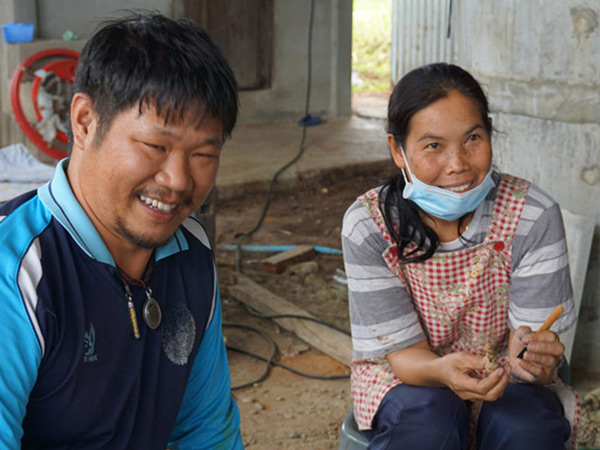Forest Smallholders Project (closed)
Smallholder tree growers and micro, small and medium-sized enterprises (MSMEs) are very important value chain actors, managing a sizeable proportion of rural lands in the Asian region. They contribute to the local economies, create formal and informal jobs in rural areas, and help achieve government policies to increase national forest cover and reduce deforestation and forest degradation. MSMEs are critical suppliers for the domestic market and play an important role in international supply chains for forest-based commodities from timber to rubber, coffee, cocoa, and palm oil.

Although this sector has enormous potential to alleviate poverty in rural areas and reduce climate impacts, they continue to face challenges ranging from lack of education, information, and technical knowledge to financial insecurity and poor representation in policy processes. These challenges hinder their participation in legal and sustainable supply chains.
Our objective: promoting legal and sustainable practices in the forest sector
We strived to empower MSMEs and smallholder tree growers in the forest sector across the Mekong region by expanding their knowledge and capacities, creating enabling conditions that allow them to be actively involved in reducing deforestation and forest degradation and driving sustainability. Our efforts focused on identifying and addressing key challenges these enterprises face by providing them with the necessary tools and support to meet the requirements and standards of responsible sourcing. We increased their position in policy development at the local and national levels and improved their access to finance, support, and services like marketing and business development.
Our work: supporting wood-based MSMEs in four Mekong countries to operate legally and sustainably
From 2016-2023, the Forest Smallholders Project supported smallholder tree growers and wood-based MSMEs in four Mekong countries to operate legally and sustainably: Lao PDR, Myanmar, Thailand, and Viet Nam. Under the project, we tested different solutions to their key challenges through pilot projects.
We worked with all actors relevant to smallholder tree growers and MSMEs in forest product supply chains, namely national and local governments, local and national authorities, policy makers, industry associations, civil society organisations (CSOs), private and national development banks, and vocational training institutions.
We supported the inclusion of smallholder tree growers’ and MSMEs’ interests and concerns in national policy processes such as in the context of Voluntary Partnership Agreements (VPAs) with the European Union on Forest Law Enforcement, Governance and Trade (FLEGT).
In terms of gender equality, we analysed the roles, positions and challenges of women in small-scale forest product supply chains. We provided opportunities to develop support mechanisms and capacity building that actively supported women’s engagement and economic empowerment in the forest sector.
Lessons learnt from the pilots were documented and shared nationally, regionally and internationally. Where appropriate, the lessons fed directly into policy processes and pilots were upscaled nationally.
Results
Training and capacity building
The project supported smallholder tree growers and MSMEs through customised coaching and training on:
- Plantation management, making tree inventories and using digital tools to collect geolocation information.
- Complying with relevant laws and regulations.
- Expanding their businesses to include basic processing, and creating a market for their products.
- Financial literacy and management, including product costing and increasing product value.
We also conducted study tours to larger enterprises, on-the-ground engagement of local authorities, policy makers and financial institutions, and the establishment of associations.
Improving business practices
We assisted MSMEs to continuously improve the efficiency of their operations, occupational health and safety, recording inputs and outputs, marketing and connecting to larger enterprises. Our work also promoted the circular bioeconomy by strengthening reclaimed timber supply chains by helping wood processors manage their wood waste and turn it into additional income.
Women’s empowerment
Focus was placed on strengthening women-led enterprises and the role of women in tree-growing communities and MSMEs. This led to increased interest among the authorities and industry associations, who are now more willing to promote gender equality in the forest sector.
Lessons learnt
In light of the growing connection between smallholders, international trade, climate change, and deforestation, the approach, tools, and methods used in the project can be adapted to support smallholders beyond the forestry sector and help to ensure that demand-side policies do not leave anyone behind. For example, the market-based approach that emphasised building smallholders’ business and financial management skills while promoting the creation of legal supply chains could be useful in agriculture. Our expertise in organising and linking smallholders to policy processes, as well as strengthening local governments, national associations and CSOs, could also be transferred to other sectors. Promoting gender equality by incorporating gender awareness in technical training, empowering women, and coaching women-led enterprises could be especially useful in other sectors.
Resources
- Publications
- Training materials and other resources
- Video: Women’s engagement in small-scale forest plantations and timber processing
Please visit the website of the Forest Smallholders Project to know more about our work (archived in 2023).
Contact: Thomas Colonna
Support to forest smallholders in the Mekong region was made possible through contributions from the Swedish International Development Agency (Sida).

